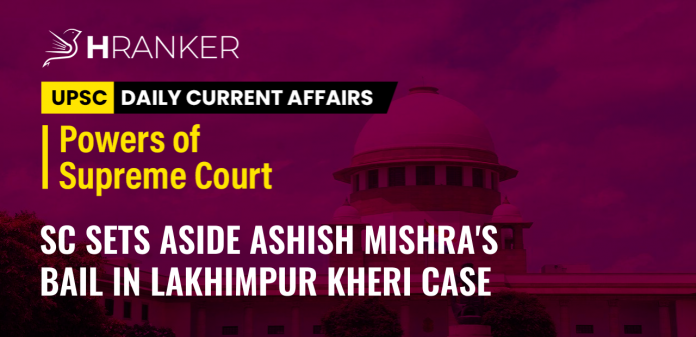WHAT’S IN NEWS: Supreme Court has said that the High Court exceeded its jurisdiction and denied the victims a chance to participate in the bail proceedings, directing the accused to surrender in a week.
- BAIL: Bail is the conditional release of a defendant with the promise to appear in court when required. It is a set of pre-trial restrictions that are imposed on a suspect to ensure that they will not hamper the judicial process.
- VICTIMOLOGY: It is the study of victimization, including the psychological effects on victims, the relationship between victims and offenders, the interactions between victims and the criminal justice system—that is, the police and courts, and corrections officials—and the connections between victims and other social groups and institutions, such as the media, businesses, and social movements.
PRINCIPLES GOVERNING THE BAIL JURISPRUDENCE:
- It is settled law that while granting bail, courts only ought to take a preliminary view as to involvement of the accused in the offence.
- The nature and gravity of offence and severity of the punishment if there is a conviction.
- The possible effect of giving bail to the accused, such as the scope for tampering with evidence, intimidating witnesses, influencing the outcome or the possibility of the accused fleeing justice.
STANCE OF THE SUPREME COURT:
- Supreme Court said that the Allahabad High Court exceeded its jurisdiction, denied victims a chance to participate in the bail proceedings and was in a “tearing hurry” to grant bail” and they could “rightfully cancel the bail”.
- The Supreme Court has rightly pointed out that the High Court had needlessly gone into the nature of the evidence relating to the incident.
- The apex court’s conclusion that irrelevant material was considered for grant of bail, while ignoring established parameters, is unexceptionable.
- The court said that the High Court had “adopted a Myopic View of the evidence” and denied “a fair and effective hearing” to the victims.
- Commenting on the Rights of Victims the Court observed that Victims have unbridled participatory rights from the stage of investigation to culmination of proceedings and Victims have been clearly denied an opportunity to be heard at the time of grant of bail to the accused.”
- By describing the rights of a victim of a crime as “substantive, enforceable and another facet of human rights,” the Court has advanced the cause of victimology as a part of criminal law.
- As a result of both changes in the law and emerging jurisprudence, victims are now in a position to get compensation as well as the status of a participant in the prosecution of offenders.
WAY FORWARD:
When the victim comes forward to participate in a criminal proceeding, he must be accorded an opportunity of fair and effective hearing. Victims certainly cannot be expected to be sitting on the fence and watching the proceedings from afar, especially when they have legitimate grievances. The verdict should lead to greater participation by victims in the criminal process and thus help the cause of justice.
In consonance with this, Supreme Court has asked the High Court to decide the Bail Plea afresh in a Fair, Impartial and Dispassionate manner, keeping in view the settled parameters, preferably within 3 months.




